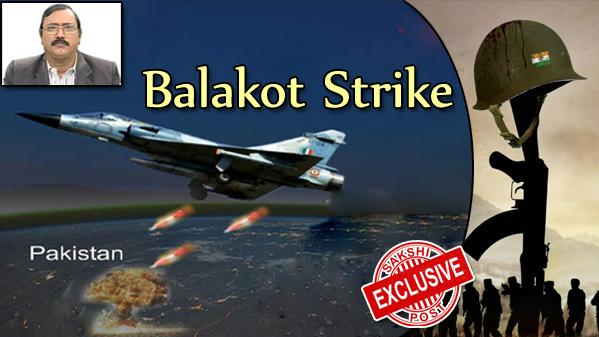Balakot Strike Proves India’s Resolve To Stamp Out Terrorism

Kommineni Srinivasa Rao
Prime Minister Narendra Modi has proved to be a man true to his word. He had vowed to dismantle terror camps in Pak occupied areas and in the country itself. No wonder then that when the Indian Air Force carried out lightening strikes against terror camps in Balakot of Pakistan run by Jaish-e-Mohammad (JeM), the entire country stood in solidarity to salute our armed forces. Modi had also promised to avenge the Pulwama terror attack carried out by the same terrorist group on February 14. Importantly, PM Modi announced publicly that the armed forces had been given a free hand to respond in the matter. The entire country shook with anger over the Pulwama terror attack in which over 40 CRPF jawans were martyred. The attack also made India and PM Modi seem vulnerable and cast a long shadow on his leadership abilities. Soon, the Pulwama terror attack came in for political criticism and some politicians even attempted to justify Pakistan's stance and later backpedaled on their version. It appears, however, that the centre moved with competence in a strategic manner in the matter.
As a first, it withdrew security to separatist leaders in J&K. 150 Separatist leaders were also arrested. Later 12,000 soldiers were sent to the Kashmir valley and prepared the ground for some significant development. At the same time, the Modi government reached out to the United States and other world powers expressing its concerns over the terror machinery being operated by the Pakistani state.
Apart from China, all other countries appreciated India's concerns, it appears.
US President Donald Trump indirectly hinted at support for India. After taking all necessary precautions on all fronts, the Indian Air Force acted with strategic skill and showered heavy payloads of bombs in the forest region of Pakistan where JeM ran its terror university. Significantly, there were no civilian casualties in the IAF strike which is being hailed as a lesson to terrorists.
India's foreign secretary Vijay Gokhale stated that these were pre-emptive strikes to defend the nation against many future attacks which were being planned by the terror outfits and not an act of war.
Pakistan's response to this strike needs to be watched. The neighbour is now claiming that while there was a strike in Balakot, there were no casualties. No matter what Pakistan might say, one thing is evident—it is left dumbstruck by this demonstration of India's military power. The fact that the country's PM Imran Khan could not respond immediately is in itself a sign of its weakness.
Meanwhile, it was also reported that Masood Azhar, the JeM chief was moved to a safe location by ISI. If Pakistan does not act now, there would be further instability in the region, because the country's politics revolved around terrorism and the Army. Many leaders and civilians have lost their lives to terrorist attacks. So far, it appears that the country has not woken up and demonstrated any resolve to stamp out terrorism in a country where even a child like Malala was not spared by extremists. It is being said that even if India holds the upper hand today, Pakistan would respond in some way or the other. Therefore, there is a need to be even more vigilant, reports say. The entire nation is saluting the efforts of IAF which finished the balakot operation in 21 minutes flat. All politicians have hailed the move and it must be said that the strike has also enhanced PM Modi's standing substantially.
Also Read: Surgical Strike 2: Narendra Modi Calls It A Festive Occasion




